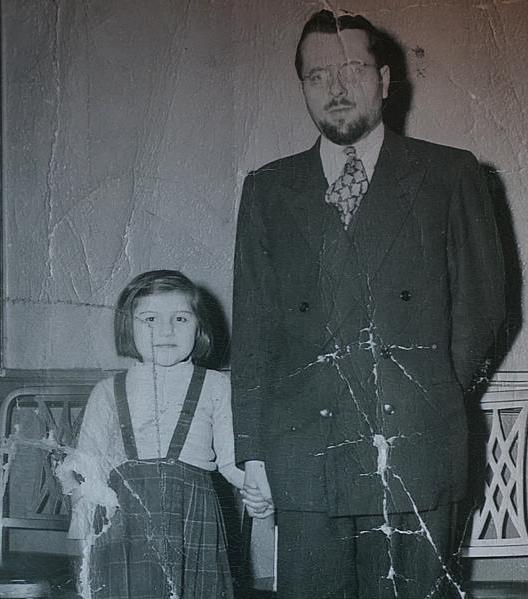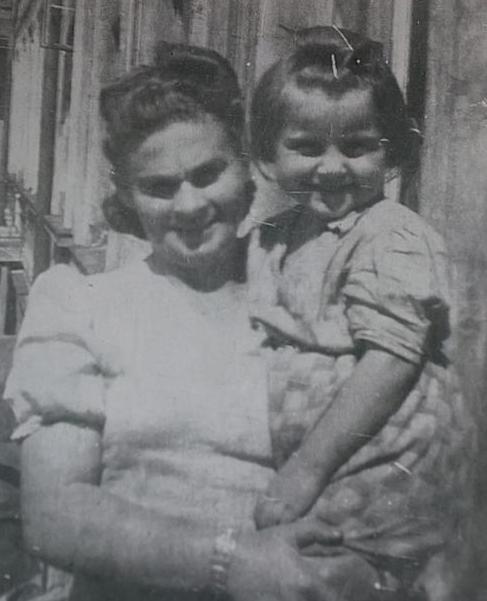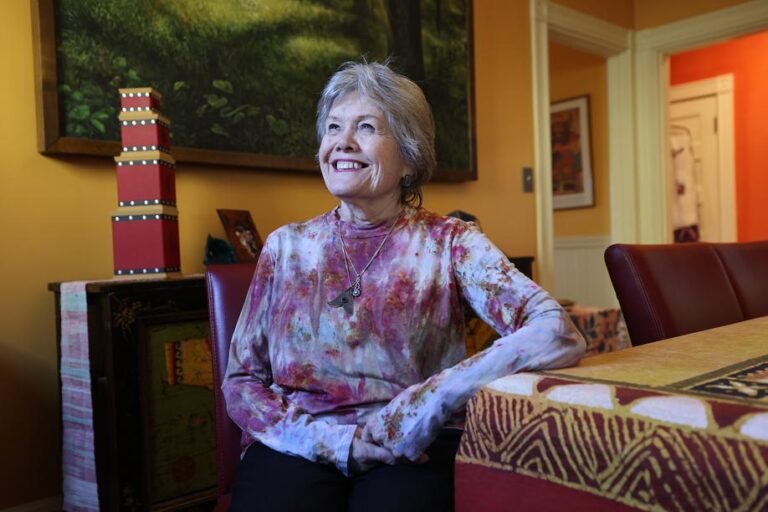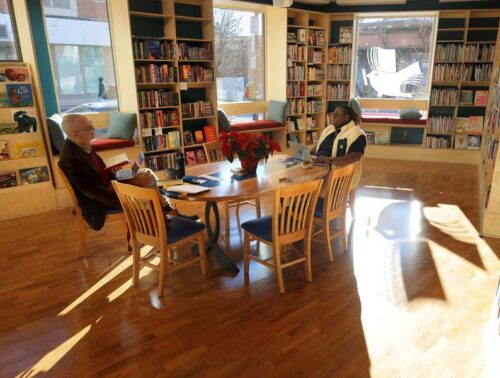
Vilunya Diskin’s earliest memory is as a 4-year-old, traveling on a train through a country that no longer exists, being implored to stay quiet as she and others fled the genocidal violence convulsing much of Europe.
In the early 1940s, authorities had consigned her parents to a Jewish ghetto in their hometown, now known as Lviv, but Diskin escaped their fate when she was left in the care of others. The antisemitic persecution continued even after the Soviet Army liberated the city from the Nazis, as they sought to arrest the rabbi who was taking care of her because he rescued Jewish children from orphanages. So they fled in the middle of the night.
“What I remember is being very quiet, just not talking at all, because that’s what he told me to do,’’ she said of the train ride.
Diskin’s flight would eventually bring her to the United States, where she was adopted by a Jewish family and raised in California before settling in Boston as a young adult. She would become a feminist icon when she coauthored the seminal text “Our Bodies, Ourselves’’ in 1970.
But she never saw her parents again, nor did she know what had become of her twin sister. The answers would be lost to the cataclysm of the war until, eight decades later, she finally found out who she really is.
Memory can be a tricky thing. In Diskin’s earliest recollection, she is the ward of a rabbi, Israel Leiter, and his family, and believes they had fled Poland and were traveling through what was then Czechoslovakia. Before Leiter, Diskin had been hidden away for years by a Catholic woman who had been a childhood friend of her father. Her twin sister wasn’t so lucky. Unbeknownst to Diskin, her sibling was dead.
Years later, as a college student at the University of California, Berkeley, in the early 1960s, she would flip through Polish-language magazines, searching for photos of her sister, though she could no longer understand the words. She eventually made requests to archivists in Israel who specialize in information about those killed in the Holocaust. There were obstacles, missing or incorrect bits of information, which complicated her search. She had the wrong year and wrong location of her birth. She had her parents’ last name, but not their first names.
A longtime resident of Jamaica Plain and now 83, Diskin finally has some answers. Her parents were named Salomon and Edzia, and she knows the identities of her grandparents and great-grandparents, what some of them did for work, and when some were born, married, and died.
And thanks to the work of the Holocaust Reunion Project, she now knows her birth name: Wilhelmina Fliegelman.
“In many ways, it’s like a rebirth,’’ she said recently in between sips of tea at a cafe in her Boston neighborhood. “Here I am in my 80s and it’s a whole new chapter.’’
Jennifer Mendelsohn and Adina Newman, specialists in Ashkenazi Jewish genealogy, pieced together Diskin’s past. In this case, they used a DNA match list that included distant familial connections to Diskin to reverse-engineer her family tree, using available records and databases from Europe and Israel to fill in the gaps.
“It’s a puzzle with meaning,’’ Newman said during a recent interview.
For both her and Mendelsohn, the discovery of family roots and relatives can be rewarding, but also bittersweet.
“These are always happy reunion stories but they’re built on a foundation of very, very, very, awful, painful trauma,’’ Mendelsohn said.

Diskin’s parents, she has discovered, worked in a bakery run by her grandfather. She has the address of the bakery, as well as the address of her first home in Lviv, which is now in present-day Ukraine. She hopes to visit after the latest war in that part of the world — a conflict that has pitted Ukraine against Russia — is over.
“This is profound,’’ she said. “It is profound to fill those holes.’’
Her twin sister’s name was Amalia. The Catholic woman who took her in when her parents were taken away was Anna Demenczuk, and Diskin lived with her for three years. When her father, Salomon, failed to return after Lviv was liberated, Demenczuk honored his wishes that Diskin be raised by a Jewish family, giving her over to Leiter, a local rabbi. After fleeing through Europe, Leiter and his family eventually emigrated to New York, taking Diskin with them. In the United States, she was adopted by a Jewish American couple at the age of 7 and grew up in California.
In her youth, she was drawn to the civil rights movement because, she said, of her background surviving the Holocaust. She saw parallels between the treatment of Black Americans and the historic oppression of Jews.
She has lived in Greater Boston since the mid-1960s. In her 20s, she was a member of a local 13-member collective that wrote “Our Bodies, Ourselves,’’ an influential text that has been celebrated as the bible of women’s health, updated multiple times over the decades to introduce generations of girls to their own anatomy. That advocacy was born out of frustration with how little doctors knew about how women’s bodies worked and how they failed to listen to female patients.
Diskin cuts an energetic presence, willing to discuss modern-day politics or history with a smiling frankness. Nowadays, she worries the United States is “galloping backward into the 19th century’’ regarding women’s rights.
“The women’s movement has always said that knowledge is power,’’ said Diskin, who has two children and three grandchildren. “And that’s exactly right.’’
And now, learning her own history has made her feel even more powerful, she said. When she received a trove of information in September that revealed so much about her family and her past, Diskin said she did not cry but did feel so overwhelmed that she took a long nap.
“This information is so big,’’ she said. “It’s so gigantic.’’
To be sure, there are remaining mysteries she may never unravel. She knows when and where her mother died; she was not sent to a concentration camp but to a ghetto established specifically for Jews in Lviv, Diskin said. Her mother died the same year she was born. But she does not know what became of her father. She assumes he was killed in the Holocaust; otherwise, he would have returned for her. He would have known where to look, she said. And while she knows that her twin sister died at only three months of age, she does not know the circumstances of her death.
Still, she is buoyed and heartened by the new revelations. She now has photos of her biological parents, whose faces she previously could not conjure up. She has cousins she never knew about in Israel and Australia. She has corresponded with the son of Demenczuk, the woman who took her in. She considers him a long-lost brother. And she is pushing for Demenczuk’s name to be added to a memorial in Israel honoring those who risked their safety to save Jews during the Holocaust.
The only heaviness she felt in finally receiving the news of her birth parents was that she could not share it with her husband, Martin, who died in 1997. She is a self-described optimist, someone who wakes up happy, and she credits researchers such as Mendelsohn and Newman, as well as “the miracle’’ of DNA testing, that allowed “important facts’’ to be realized. The Nazis, she said, tried to erase Jews from history, and this kind of research is a form of justice.
“It’s righteous work,’’ Diskin said, “and it’s important work.’’
Danny McDonald can be reached at daniel.mcdonald@globe.com. Follow him @Danny__McDonald.

